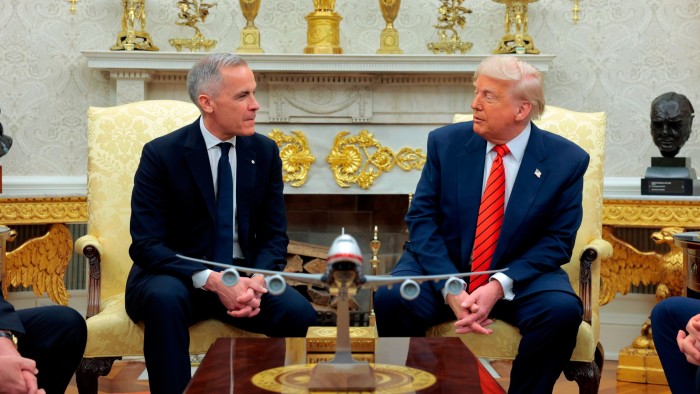Share this @internewscast.com
Unlock the White House Watch newsletter for free
Canadian Prime Minister Mark Carney made it clear to Donald Trump that Canada was “not for sale” during their meeting at the White House on Tuesday, thereby dismissing the US president’s suggestion to incorporate Canada as the 51st state of the United States.
“Much like in real estate, some properties are simply never on the market,” Carney stated to Trump during an otherwise friendly conversation in the Oval Office. “Through my interactions with the Canadian people throughout the campaign… it’s evident that Canada is not, and will never be, for sale.”
But in a sign that tensions are likely to persist between Washington and Ottawa, Trump responded by saying: “Never say never.”
Trump responded by acknowledging, “I’ve encountered numerous situations that seemed impossible but were eventually achieved, all thanks to amicable negotiations,” and he remarked, “In due time, we’ll see what unfolds.”
The meeting at the White House was the first in-person encounter since Carney won the Canadian election last month on a staunch anti-Trump platform.
The US president’s hostility to his northern neighbour — with repeated threats to annex Canada and the imposition of tariffs in violation of a free trade agreement — dominated the Canadian election campaign and helped propel Carney’s Liberal party to victory.
But Trump opened the conversation with a friendly quip about Carney’s victory. “I think I was the greatest thing that happened to him,” he said, adding: “It was probably one of the greatest comebacks in the history of politics, maybe even greater than mine.”
He then described the prime minister as a “very talented person, a very good person”.
“I have a lot of respect for this man,” he added.
Carney, who joked he was on “the edge of my seat” during the meeting, said he was focused on improving defence, strengthening the border and fighting fentanyl trafficking. Both he and Trump said they were open to renegotiating the USMCA trade agreement, which succeeded Nafta during Trump’s first term and is up for review next year.
“The USMCA is a good deal for everybody,” Trump said. “It was actually very effective and still very effective but people have to follow it, and that’s been a problem.” Carney said: “[The USMCA] is a basis for a broader negotiation. Some things about it are going to have to change.”
But the US president made clear that he remained sceptical of free trade with his Canadian neighbours, especially in the automotive and metals sectors.
“We want to make our own cars. We don’t really want cars from Canada,” Trump said. “And we don’t want steel from Canada because we’re making our own steel, and we’re having massive steel plants being built right now as we speak.”
Speaking at the Canadian embassy after the meeting, Carney told journalists the talks with Trump were “wide-ranging” and “very constructive”, adding “this is the point at which a serious discussion begins”.
“We’re having a very complex negotiation about a wide range of issues and as I said before I came here, I wouldn’t have expected white smoke coming out of this meeting,” he said.
The prime minister said he and Trump had discussed how they could enhance the Canadian and US auto industry “versus foreign competition, including from Asia”.
He added that while Trump was willing to renegotiate the USMCA trade deal and drop tariffs “that does not presuppose an outcome”.
“There’ll be zigs and zags, difficult aspects to it but the prospect is there. We discussed it in more detail and as I said, we’ll be following up . . . between officials, but also he and I in the coming weeks.”







